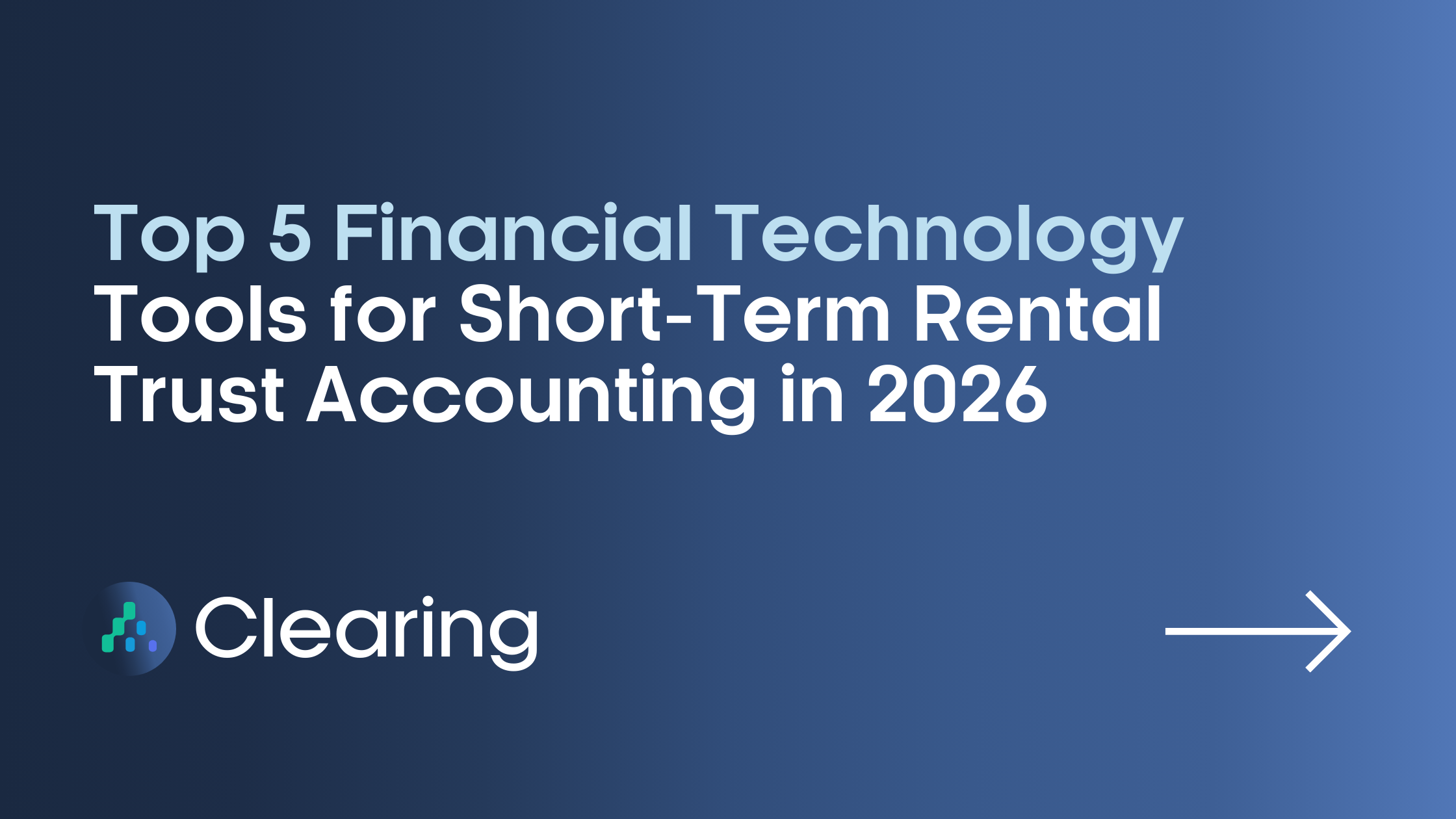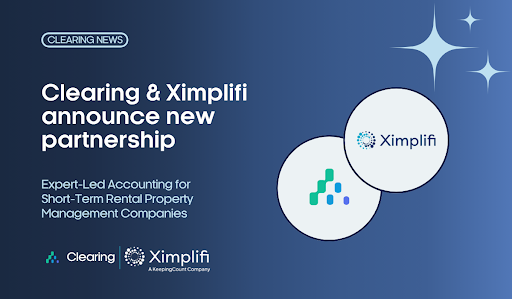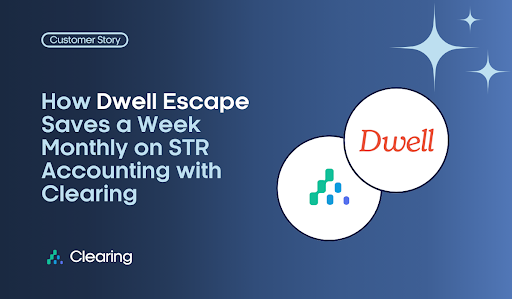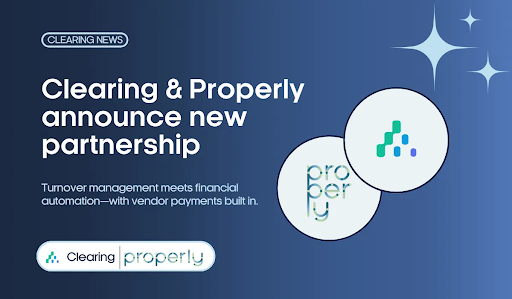The Rise of Virtual Cards in STR Trust Accounting: A Fintech-Driven Compliance Shift
As trust accounting requirements grow stricter across the U.S., virtual and physical cards are emerging as a powerful compliance tool for Short-Term Rental property managers. This article explores how fintech card solutions help managers track reimbursable expenses, enforce fund segregation, and streamline trust accounting workflows in regulated states like North Carolina.
September 12, 2025
Corey
.png)
Understanding Trust Accounting in Short-Term Rental Property Management

Trust accounting forms the backbone of financial compliance for Short-Term Rental (STR) property managers, especially in jurisdictions with strict real estate fiduciary requirements. In the U.S., states such as North Carolina, Florida, and Oregon categorize STR managers as fiduciaries. This legal status obligates property managers to maintain strict segregation of client funds, provide transparent record-keeping, and produce audit-ready ledgers on demand.
The stakes for getting trust accounting wrong are exceptionally high. Failure to comply can result in:
- License suspension or revocation
- Legal liability and financial penalties
- Loss of client trust and reputational harm
Regulatory agencies—such as the North Carolina Real Estate Commission—enforce requirements that include:
- Dedicated trust bank accounts (distinct from operating accounts)
- Itemized accounting by owner, property, and transaction
- Continuous and three-way reconciliations
- Comprehensive documentation for every dollar of movement
The complexity multiplies as STR portfolios scale, with managers regularly overseeing dozens or hundreds of owners and properties. Each expense or disbursement must be traceable, defensible, and categorized in compliance with local statutes (see NC Real Estate Commission Trust Account Guidelines as an example).
The Operational Pain Point: Reimbursable Expenses Create Compliance Gaps

Despite clear legal requirements, day-to-day STR operations can threaten trust compliance. A major friction point involves reimbursable expenses. Property managers are constantly making purchases for repairs, linens, cleaning supplies, or emergency services. Too often, these expenses are:
- Paid from personal or company credit cards
- Commingled with the manager’s own operating funds
- Tracked manually in spreadsheets or with inconsistent documentation
This traditional approach introduces multiple risks:
- Commingling of Funds: Using company or personal cards for client expenses blurs the legal line between trust and operational finances.
- Audit Trail Breakdowns: Manual workflows and missing receipts make it difficult to provide the thorough documentation regulators or owners may demand in the event of a dispute or audit.
- Delayed and Inaccurate Reimbursement: Property managers often “float” expenses and must later recover them from trust accounts—an inefficient cycle that delays reporting and undermines transparency.
As a result, owner/state audits become more time-consuming, owner confidence can erode, and managers expose themselves to fines or worse should documentation fall short.
Virtual and Physical Cards: Modern Fintech’s Compliance-First Solution

Recent advancements from fintech platforms have redefined how property managers approach spend management at the trust accounting level. Rather than relying on generic corporate cards or outdated petty cash systems, managers now have access to fully programmable virtual and physical cards—purpose-built for STR operations.
How Fintech Card Solutions Work
Modern spend management tools integrate with STR trust accounting systems and offer:
- Instant creation of virtual cards or issuance of physical cards
- Assignment of cards to specific properties, owners, team members, or expense categories
- Customizable spending limits, merchant restrictions, and pre-set expense categories
- Real-time transaction feeds, enabling immediate allocation
- Automatic digital receipt capture and transaction-level documentation
For example, a maintenance technician handling repairs for Property A can be issued a virtual card designated only for that unit, with authority restricted to approved vendor categories and a set budget. Each transaction is directly tied to that property’s sub-ledger, and all receipts are captured and stored. This eliminates commingling, automates expense categorization, and dramatically simplifies both reconciliation and reporting.
Why Virtual Cards Enhance Trust Fund Compliance
The advantages extend well beyond convenience:
- No Commingling: All client-related spend flows directly from trust funds, never touching personal or operating accounts.
- End-to-End Transparency: Every transaction is tagged by property, owner, category, and even vendor, making audits straightforward and reducing risk of mistaken allocations.
- Reduced Owner Disputes: With robust backup documentation and property-level tracking, managers can defend every reimbursable expense—improving owner satisfaction and trust.
- Streamlined Workflows: Automated transaction posting and categorization frees your accounting team from manual, error-prone expense reconciliation.
Regulated States Set the Standard
In tightly regulated environments—such as North Carolina—using virtual or physical cards tied directly to trust accounts supports fiduciary best practices and satisfies examiners’ expectations for clean, auditable separation of funds. This shift is increasingly becoming a baseline expectation, not a luxury.
Best Practices: Designing a Compliance-First STR Spend Management Workflow

Adopting advanced fintech card tools is most effective when paired with a strategic, compliance-driven workflow. Here are several practical recommendations:
- Issue Property- or Owner-Specific Cards: Never permit team members to use their own funds for client expenses. Allocate cards by property, owner, or business role.
- Pre-Code Card Usage: Restrict cards by allowable spend category, merchant, and dollar threshold. This prevents incidental or accidental commingling.
- Automate Data Sync: Select spend management platforms that integrate with your trust accounting software. Transactions should post instantly to the relevant owner ledger for full traceability.
- Capture Documentation Upfront: Enforce receipt uploads at point-of-purchase; most modern platforms support mobile capture, reducing lost receipts and paper trails.
- Run Periodic Compliance Reviews: Treat spend management reports as part of your internal controls. Check for anomalies that might indicate misuse or incorrect allocations.
By hardwiring these controls into your operations, you move from a “compliance as afterthought” model to a “compliance by design” paradigm.
Why the STR Industry Must Modernize Now

The evolution of state regulations and the rapidly increasing scale of STR management are making yesterday’s manual practices unsustainable. Relying on personal reimbursement, paper receipts, and spreadsheets creates risk—both to your license and your reputation.
By leveraging modern fintech card solutions, STR operators can:
- Simplify expense tracking and trust account reconciliation
- Ensure all funds flow in accordance with the law
- Build an automated, defensible audit trail while saving staff hours each month
The future of STR trust accounting is transparent, precise, and automated. Modernizing your spend management is not just an operational upgrade—it is fundamental to ongoing compliance and trust with both regulators and property owners.
Take Action: Bring STR Financial Management Into the Modern Era
The landscape for Short-Term Rental property managers is evolving quickly—and so are the compliance requirements. Don’t wait to update your financial workflows, especially in regulated states like North Carolina where trust fund violations carry steep penalties.
To see how automated, compliance-first spend management can help your STR business remain audit-ready and efficient, book a personalized demo today.
Clearing is a Financial Technology Company, not a bank.






.png)
.png)
.png)

.png)

.png)


.png)
.png)
%20(1).png)
%20(1).png)
%20(1).png)
.png)
%20(2).png)
%20(1).png)
%20(1).png)
.png)

.png)
.png)
.png)
%20(1).png)
.png)
.png)
.png)
.png)
.png)
.png)
.png)
%20(1).png)
.png)
.png)
.png)
%20(1).png)
%20(1).png)
%20(1).png)








.jpg)
%20(1).png)
%20(1).png)
%20(2).png)
%20(1).png)

%20(1).png)
%20(1).png)
%20(1).png)



%20(1).png)
%20(1).png)
%20(1).png)
%20(1).png)
%20(1).png)


%20(1).png)
%20(1).png)
%20(1).png)
%20(2).png)
%20(2).png)



%20(2).png)


%20(2).png)
%20(1).png)
.png)


%20(2).png)
%20(2).png)

.jpg)
.png)
.png)
.png)



.png)

.png)